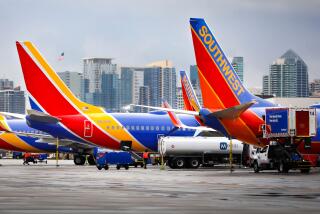From the skies, a folk hero
- Share via
In the wake of the sudden fame of Steven Slater, the JetBlue flight attendant who, as you’ve surely heard, dramatically walked off the job last week when he cursed out an unruly passenger, inflated the aircraft’s emergency slide and plunged feet first to instant celebrity (after grabbing two beers for the road), I’ve spent the last few days trying to figure out the ins and outs of his new occupation: folk hero.
According to Wikipedia (yes, I just resorted to that middle school term-paper info source), a folk hero’s “single salient characteristic” is “the imprinting of the name, personality and deeds of the character into the popular consciousness. This presence in the popular consciousness is evidenced by mention in folk songs, folk tales and other folklore. Folk heroes are also the subject of literature and some films.”
At first glance, Slater meets the wiki criteria. Within hours of his grand gesture, several Facebook pages had popped up in his honor (imprinting of his name into the popular consciousness: check). Since then, a number of odes have emerged, including a ditty by television personality Jimmy Fallon called “The Ballad of Steven Slater” (mention in folk songs: check). There’s also, of course, already talk of a reality show (subject of “some films”: half a check).
But the wiki criteria don’t go far enough. I think Slater’s a folk hero because he has all the makings of the perfect symbol of the contemporary oppressed working stiff, and even the working professional. That’s right, we’re all flight attendants now.
His job, however banal it’s become and however low paying it remains (according to the Assn. of Flight Attendants, salaries average about $35,000 a year), holds a certain fascination. As much as flight attendants are the butt of jokes and the punching bags for all manner of air rage, they also capture our imagination in a way that few workers at that level do.
For one thing, their work is a public performance. They are costumed and easily identified, often scrutinized and sometimes even fetishized. For another, as passengers, we’ve been hit about as hard as flight attendants with the slings and arrows attacking the airline industry. Slater’s plight is relatable. Our flight delays are their flight delays.
And even though the majority of American workers don’t have job descriptions that include mixing a drink and evacuating a jet in 90 seconds (or, alas, access to an inflatable slide), a good number of us toil under conditions brought about by the same forces that have made air travel so miserable for passengers and crew alike.
That is to say, we’re all participating in some version of an argument with someone who has too much baggage. We’re all working longer hours for less pay. We’re all watching our co-workers get laid off and fearing (and perhaps occasionally half-hoping) we’ll be next. Like flight attendants, we’re all trying to make nice and keep things in line at the same time.
Commercial air travel can function as a symbol for so much that’s wrong with contemporary life. The soldier who goes AWOL might be seen as a symbol of a broken system or one bad unit, but the flight attendant who snaps may be more like a casualty of a broken dream. It once was glamorous to fly; it had a sheen of innovation, of vaulting American Century ambitions. And even after the glamour got discounted, it was still aspirational, a luxury that wasn’t beyond middle-class reach, a perk for Everyman.
So sure, Slater’s personal “breakdown” struck a “take this job and shove it” chord. But it’s the larger breakdown of air travel, and its relationship to what we like to call the American way of life, that’s made that chord so resonant.
It’s not so much that Slater’s a folk hero. It’s that so much of what we used to love about flying now seems like folklore.
More to Read
Sign up for The Wild
We’ll help you find the best places to hike, bike and run, as well as the perfect silent spots for meditation and yoga.
You may occasionally receive promotional content from the Los Angeles Times.







